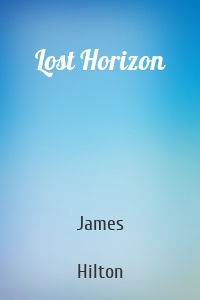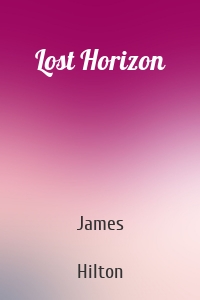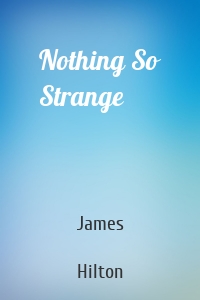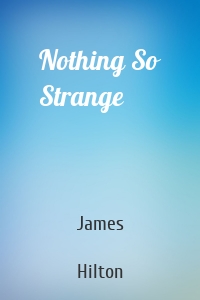James Hilton
11 кн.
Lost Horizon
In 1931, four people, including Glory Conway, escape the political unrest in Baskul, China by boarding a plane, bound for Peshawar. The plane, however, much to their dismay, has been hijacked and eventually crash lands deep in the far reaches of the Tibetan Himalayas. Seeking shelter, the group soon finds themselves in the valley of the blue moon, guests at a lamasery, called Shangri-La.
| Автор | James Hilton |
Lost Horizon
In 1931, four people, including Glory Conway, escape the political unrest in Baskul, China by boarding a plane, bound for Peshawar. The plane, however, much to their dismay, has been hijacked and eventually crash lands deep in the far reaches of the Tibetan Himalayas. Seeking shelter, the group soon finds themselves in the valley of the blue moon, guests at a lamasery, called Shangri-La.
| Автор | James Hilton |
Nothing So Strange
A strange story, told by indirection, as Jane Waring, through recurrent interviews with a mysterious Mr. Small who is trying to get from her all she can give him of her knowledge of Mark Bradley, tells Brad’s story, as she knows it. In complete darkness as to Small’s purpose, Jane withholds (both from him and the reader) many connecting links, impressions, emotional overtones and undertones—telling only what each question involves. Bit by bit the pieces fall into place—and when after some time...
| Автор | James Hilton |
Random Harvest
Random Harvest is a novel written by James Hilton, first published in 1941. Like previous Hilton works, including Lost Horizon and Goodbye, Mr. Chips, the novel was immensely popular, placing second on The New York Times list of best-selling novels for the year.<P> It is set in the period immediately preceding the outbreak of the Second World War. It is told in the first person of Harrison, and by means of two extended external analepses tells the story of Charles Rainier, a wealthy...
| Автор | James Hilton |
Time and Time Again
At the end of World War II, George Boswell – town councillor, newspaper editor, and zealous reformer – recalls the past 26 years of his life in the Lancashire mill town of Browdley. Published in 1953, this was Hilton's final novel.
| Автор | James Hilton |
To You Mr. Chips
Seven short stories of Mr. Chipping and his days as a schoolmaster. The book, however, begins with an account of Chipping’s own experience with the English public school system.
| Автор | James Hilton |
LOST HORIZON - The Legend of Shangr...
Shangri-La is a fictional place described in the 1933 novel Lost Horizon by British author James Hilton. Hilton describes Shangri-La as a mystical, harmonious valley, gently guided from a lamasery, enclosed in the western end of the Kunlun Mountains. Shangri-La has become synonymous with any earthly paradise, and particularly a mythical Himalayan utopia – a permanently happy land, isolated from the outside world. In the novel, Hugh Conway, a veteran member of the British diplomatic service,...
| Автор | James Hilton |
Good-bye, Mr. Chips
"Good-bye, Mr. Chips" tells the story of a much-beloved schoolteacher and his long tenure at Brookfield, a fictional boys' public boarding school. Mr. Chipping conquers his inability to connect with his students, as well as his initial shyness, when he marries Katherine, a young woman whom he meets on holiday and who quickly picks up on calling him by his nickname, «Chips.» <P> Despite his own mediocre academic record, he goes on to have an illustrious career as an inspiring...
| Автор | James Hilton |












